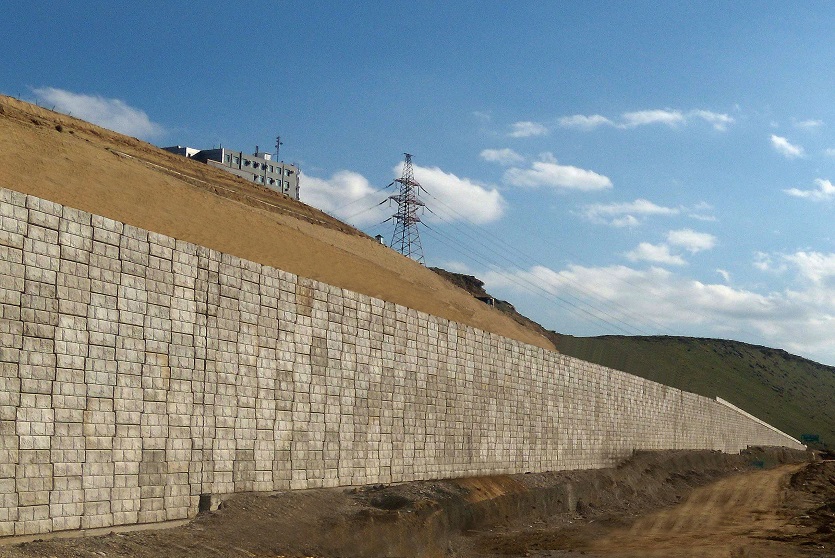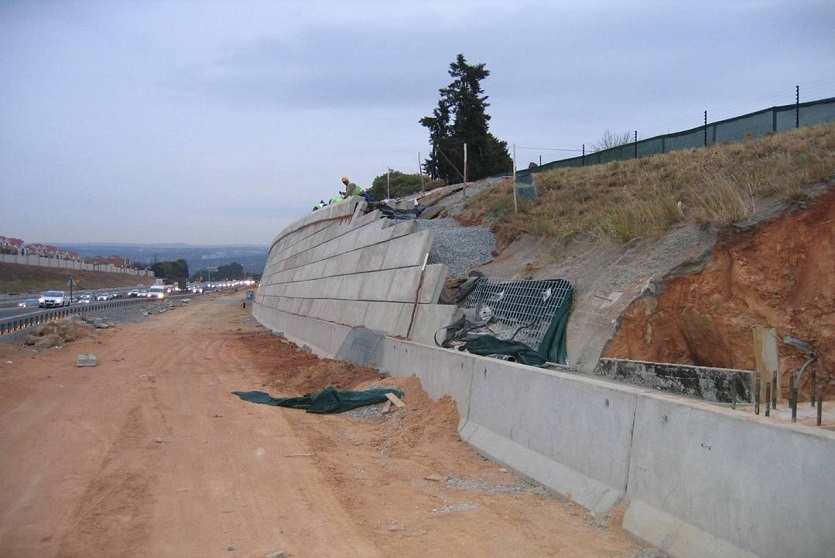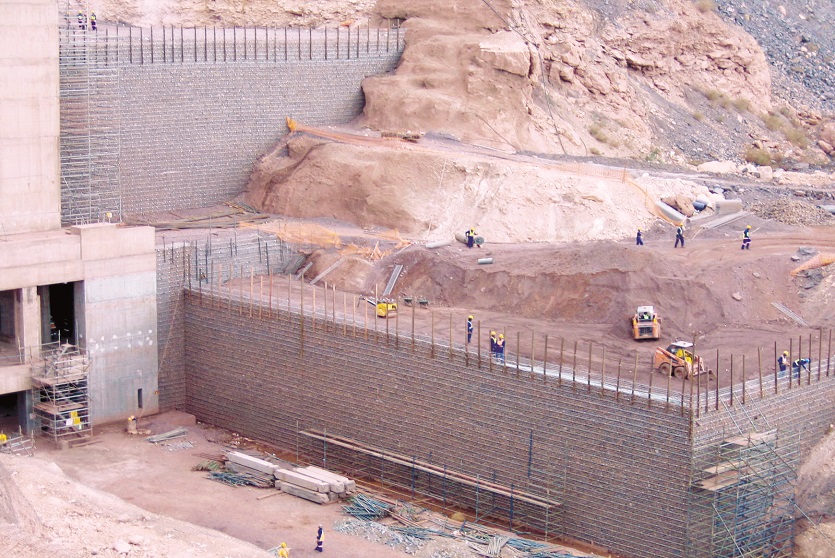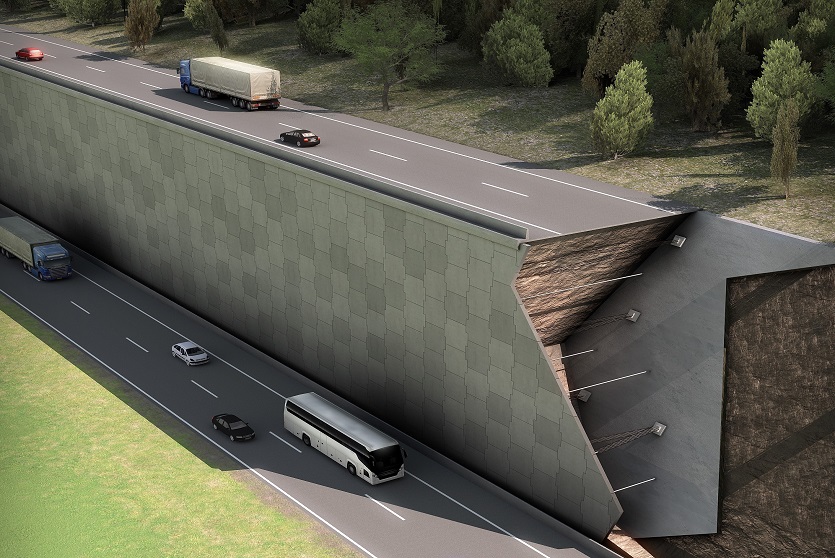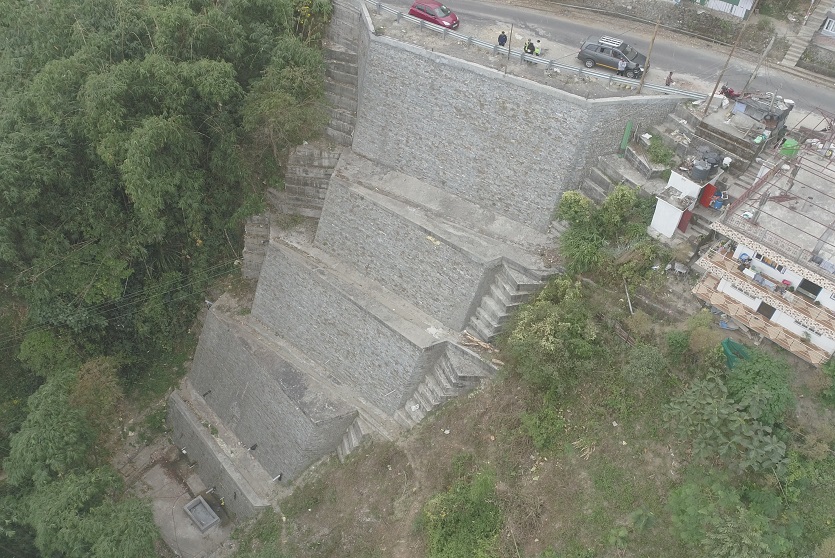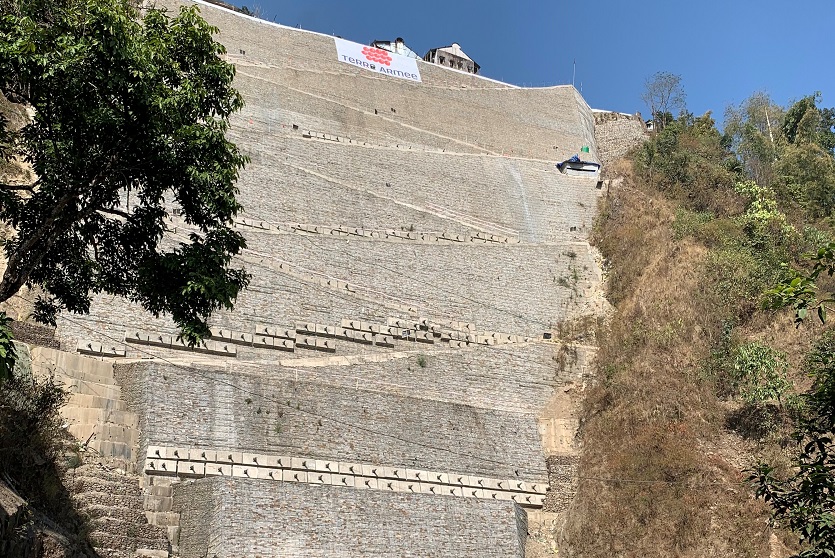Shored MSE structures (SMSE) are now widely sought by engineers that are challenged to widen or rehabilitate existing infrastructure.
Our innovative shored MSE structure solution is TerraLink®. Developed by Terre Armée, which solves challenges to build new earth-retained structures that front existing structures where limited room for expansion is available.
TerraLink® shored MSE structures
Reinforced Earth engineers have pioneered this innovative solution to link a new structure to an existing structure. With the shored MSE structure, TerraLink®, you can build widenings or additions to link an added structure to the face of a soil-nail wall, an existing concrete retaining wall or a natural feature such as sloped terrain that are allowing only a narrow space for the necessary soil reinforcements and backfill.
Road and railway widenings
The continuous increase in road and railway traffic in urban areas renders existing infrastructure as under-dimensioned. Infrastructure widening with structure additions using our TerraLink® shored MSE wall (SMSE) solution is necessary to loosen traffic bottlenecks and stabilise existing structures.
Earth shoring
TerraLink® is a cost-effective way for building a conventional earth-retained structure or shoring system in restrictive proximity to an existing slope or structure. Typical design conceptions for shored MSE walls involve significant earthwork through excavation and excessive fill, and replacements. By lowering these high costs, TerraLink® is an excellent solution.
The TerraLink® solution
Components for this shored MSE wall resemble our typical Reinforced Earth® MSE wall solution:
- Facing panels that can be made of precast concrete or welded wire mesh
- Steel or geosynthetic soil reinforcement strips that are connected to the facing elements
- Select or engineered backfill
- We also supply TerraNail™ soil nails that are naturally associated with TerraLink®
The TerraLink™ connections
Our shored MSE wall solution is intended to link an existing structure with the new TerraLink® structure. These structures are designed with either one, or a combination of two different methods for linking:
> Friction link
Alternating layers of soil reinforcements, each layer connected to one or the opposing surface
- those being solely connected to the back face of the new structure
- those being solely connected to the face of the existing structure.
> Direct link
All soil reinforcement connecting the two extremities are structurally linked directly to one another.
One or both, friction-link or direct-link connections could apply to your project.
Design approach
Key in designing the TerraLink® configuration, Reinforced Earth engineers will assess the conditions of the existing structure(s). We closely analyse the origin (existing MSE, soil nail wall, sloped terrain, bedrock, etc), as it is important to evaluate the stability of the as-built environment. We consult with you on internal and external stability in support of the new, reconfigured structure, including revised load conditions and extended service life.
Benefits
Cost savings
Cost savings
Working in areas with imited room for construction, this solution dramatically minimizes soil excavation and replacement quantities.
Optimization of materials
Optimization of materials
Offering a choice of facing elements, soil reinforcements and backfill types results in best-suit design for each project.
Finished appearance
Finished appearance
Architectural prefabricated cladding, or a natural “green” appearance is possible among your choices for wall facings.
Minimal disruption to traffic
Minimal disruption to traffic
Where a standard retaining wall would require the dismantling of an existing structure, the TerraLinkTM system enables the construction of a new wall while keeping in place the existing structure, maintaining traffic active during the construction time.
Rapid construction
Rapid construction
TerraLinkTM structures are quick to install. Materials can be delivered to site just in time for construction.
Reliability
Reliability
The internal strength and overall stability of the TerraLinkTM composite structure provides significant static and dynamic load-bearing capacity.
Adaptation to existing structure
Adaptation to existing structure
The TerraLinkTM design can be adapted to fit many different existing structures, be it a soil nail wall, and existing Reinforced Earth® wall or a natural feature, such as sloped terrain or bedrock.
Reduced environmental footprint
Reduced environmental footprint
Using less materials, requiring less space, and generating less CO2 than conventional construction methods, the TerraLinkTM technique reduces the impact on the environment.
Reduced land use
Reduced land use
TerraLinkTM structures require little land use and site impact during construction, which is a great advantage where construction projects need to accommodate existing infrastructure and busy urban areas.
You have a project ? Fill the form to contact our expert:
–None–
Australian Capital Territory
New South Wales
Northern Territory
Queensland
South Australia
Tasmania
Victoria
Western Australia
* Mandatory fields
function onSubmit(token) {
document.getElementById(“contactForm”).submit();
}


